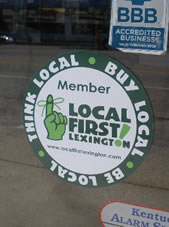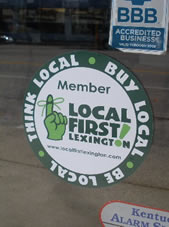I am a strong proponent of ‘buying local’ – purchasing goods and services from local businesses to boost the local economy. I made a case for Local First in our recent To-Do List for Lexington series late last year.
 But I’m not a local ‘purist’. There are times when buying local is just not practical. And there are times when non-local competition creates a healthy diversity for local consumers (and providers).
But I’m not a local ‘purist’. There are times when buying local is just not practical. And there are times when non-local competition creates a healthy diversity for local consumers (and providers).
So a recent Twitter discussion and this blog post got me thinking about the limits of ‘local’. The tenor of these conversations was that a candidate for Lexington mayor [one that I personally support, by the way] was ‘disloyal’ to Lexington for using a Washington, D.C. firm to design the campaign’s temporary website.
These discussions echoed several earlier ones about the purchase of non-local services by our city’s government.
For me, the discussions raised an important question about buying local, especially with regard to public dollars and public figures:
Should buying local goods and services be a requirement or an aspiration for a political candidate? For a local government?
The indignation of the writers seemed to imply that buying local goods was some sort of requirement – some sort of ‘litmus test’ for determining whether a candidate was good enough to run.
From my perspective, this line of thought leads to unreasonable conclusions about what disqualifies candidates (or what constitutes good governance). For instance:
- They can’t shop at Walmart. Or Kroger. Or Best Buy. Or Home Depot.
- They can’t eat at Chick-Fil-A. Or Qdoba. Or Five Guys. Or Bonefish.
- They can’t drive a Toyota. Or a Ford.
- They can’t drink Coca-Cola. Especially the imported Mexican Coke with real cane sugar.
- They must only drink Bourbon produced in Fayette County. (And wait a few years until it is actually available.)
- They can’t update their blog with an HP or Dell laptop.
- They can’t tweet with their iPhone. Or BlackBerry. Or Droid.
- They can’t watch TV produced in Hollywood. Or New York.
- They can’t use Microsoft Office. Or Adobe Acrobat.
- They can’t use Facebook.
In short: They can’t use any product or service which contains any non-local content.
Is such a list of prohibitions ridiculous? Of course.
And that’s precisely the point: Requiring some sort of ‘purity’ in local purchasing creates an excessive, unreachable, and unproductive standard.
Buying local should be an aspiration – something we strive for, something we measure and attempt to improve, something we do more of.
Do we need our city, our political candidates, and our citizens to buy more local goods and services? Should we actively encourage more purchasing at great local spots like Fáilte (profiled by Tom Eblen in yesterday’s Herald-Leader)? Absolutely, on both counts. That was why I wrote my original Local First post.
We should spend more of our money here in Lexington. But forcing our city to spend all of our money here would stifle Lexington’s economy, and restrict us from being truly productive.
So let’s adopt a reasonable posture aimed at encouraging our leaders to buy local.

